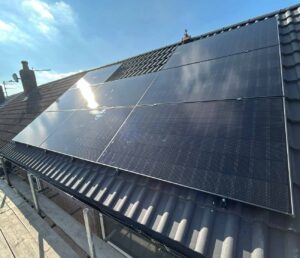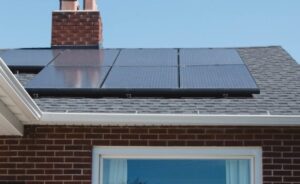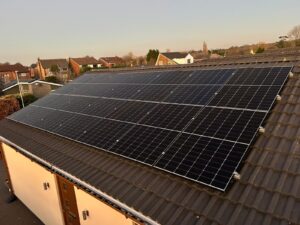As we approach winter, households in the UK are bracing for a steep rise in electricity prices. Industry experts predict that electricity bills will increase by up to 10% over the colder months, putting even more strain on family budgets. This increase, coupled with the higher demand for heating and lighting during winter, could make it difficult for many to manage their energy costs. Learn more about electricity price hikes.
Rising Energy Costs: What to Expect this Winter
The UK has seen a surge in electricity prices over the past few years, largely driven by increasing demand and volatile energy markets. This winter is no exception, with a 10% increase in electricity bills expected across the country. For households in the Northwest of England, this could mean an extra £200-£300 added to your annual energy costs.
Many households are now asking the same question: “How can we reduce these rising costs and take control of our energy future?”
Enter Solar Power: A Game-Changer for Homeowners
For those looking to avoid the financial strain of rising electricity bills, solar power combined with battery storage is emerging as one of the most effective solutions. By installing solar panels on your roof, you can generate your own electricity, reducing your reliance on the grid and shielding yourself from price hikes.
How Solar and Batteries Help Alleviate Bill Increases
Solar energy systems, especially when paired with solar batteries, enable homeowners to:
- Generate their electricity: Capture sunlight during the day and convert it into usable electricity, cutting down your reliance on traditional energy sources.
- Store excess energy: With a solar battery, excess electricity produced during the day can be stored and used later, especially during peak evening hours when energy prices are higher.
- Reduce electricity bills: By generating and storing your own power, you significantly reduce the amount of electricity you need to buy from the grid, helping you save as energy prices rise.
The Long-Term Investment of Solar Panels and Batteries
While the upfront costs of installing solar panels and battery storage might seem daunting, the long-term savings make it a brilliant investment. A typical solar setup can pay for itself in 6-10 years, depending on the system size and energy usage, with lifetime savings potentially reaching £20,000 or more. Get a free quote to check your bespoke savings.
Government Incentives and Benefits
In addition to the direct savings, the UK government offers incentives like the Smart Export Guarantee (SEG), which allows you to earn money by exporting excess electricity back to the grid. Moreover, VAT on solar panel installations is reduced, making the initial investment more accessible for homeowners. Learn about the Smart Export Guarantee.
Why Solar is Particularly Beneficial for the Northwest
In regions like Manchester, Liverpool, and Cheshire, where sunshine might be more sporadic, advances in solar technology mean that solar panels are still highly effective. Discover how solar panels work in the UK climate. High-efficiency panels can generate power even on cloudy days, ensuring consistent energy production throughout the year.
Furthermore, as energy prices are expected to continue rising, especially in the Northwest, having a solar system means you’ll be less affected by the fluctuations in the energy market.
Frequently Asked Questions (FAQs)
1. Will solar panels work during the winter months in the Northwest?
Yes, solar panels can still generate electricity during the winter. While output may be lower due to shorter daylight hours and cloud cover, modern high-efficiency panels are designed to work in low-light conditions, ensuring that your system continues to produce energy. Learn more about solar panel performance in winter.
2. How much can I save with solar panels?
Savings vary depending on system size and usage, but most homeowners in the UK can save up to 50-70% on their electricity bills after installing solar panels and a battery system.
3. Is there any financial help available for solar panel installations?
Yes, the Smart Export Guarantee (SEG) allows you to earn money by exporting surplus electricity back to the grid. Additionally, VAT on solar panel installations is currently reduced, and some local councils may offer grants or incentives. Find out more about the SEG.
4. How long do solar panels last?
Solar panels are incredibly durable, often lasting 25-30 years or more. Most systems come with a 20-year performance warranty, ensuring that your investment remains protected.
5. Can I add a battery to my existing solar system?
Absolutely! If you already have solar panels, you can upgrade your system by adding a solar battery, which will allow you to store excess electricity and use it when needed, further reducing your dependence on the grid.
Take Control of Your Energy Future with Solar and Batteries
At Flux Solar Energy, we specialise in designing and installing solar energy systems tailored to your needs. As electricity prices continue to rise, now is the perfect time to invest in solar power and protect yourself from future price hikes. We provide solar solutions throughout the Northwest, including Manchester, Liverpool, and Cheshire, helping homeowners reduce their bills and contribute to a sustainable future.
Contact us today to find out more about how solar power can benefit you this winter.





